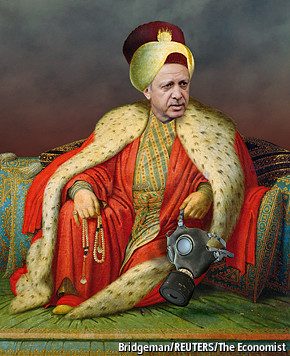Recep, the Resolute: The rise of Turkey’s new sultan with an agenda?
 Everyone’s talking about Turkish President Recep Tayyip Erdogan’s narrow win in the referendum, which allows him to style himself as a neo-Ottoman sultan.
Everyone’s talking about Turkish President Recep Tayyip Erdogan’s narrow win in the referendum, which allows him to style himself as a neo-Ottoman sultan.
The absurdist part is that Mr Erdogan could almost be said to be following a faux-European path! He is pursuing a semi-authoritarian course set by Hungary’s Viktor Orban and Poland’s Jaroslaw Kaczynski.
But in insisting that he wants to reintroduce the death penalty in Turkey, Mr Erdogan is determinedly taking an anti-European course, thereby forcing the European Union to officially break off the on-off (mostly off) talks on Turkey’s decades-old application for membership.
Now imagine what that will allow Mr Erdogan to do. He already has a grudge against Europe, having correctly diagnosed its hypocrisy in treating Muslim-majority Turkey as a different sort of applicant to any other. Once Europe officially ends Turkey’s membership application, Mr Erdogan has no choice (as leader of the Islamist AKP, it is probably not a wholly unpleasant one) but to claim the religious part of Turkey’s identity. It is possible that he will seek to revive Turkey’s leadership of the Muslim world, pursuing a neo-Ottoman ideological struggle that will conflict with the land of the Two Holy Mosques.
There is little to suggest that idea will be wholly unpalatable to the Turkish people. After all, Mr Erdogan did win his referendum, even if by a wafer-thin margin. What his victory means is that Turkey is half-and-half – deeply divided about Mr Erdogan’s virtue or villainy.
Ragip Soylu, Washington correspondent for Turkey’s pro-Erdogan Sabah newspaper, explained the referendum result as a reaction to years of turmoil, which means the resumption of the Kurdish insurgency, ISIS attacks and the failed coup attempt. He said: “I think the international media have focused more on Erdogan’s personality and less on social polarization, and what Turkish people have gone through for the last four years. Considering all of these problems, crises and hardships, the majority of the voters chose stability, and a system that provides more control and powers to Turkish government that can be influential to prevent further setbacks. The new system also creates a stronger presidency that can swiftly act against the crisis.”
But Gonul Tol, director of the Middle East Institute’s Centre for Turkish Studies, says the narrow referendum result may force Mr Erdogan to become more moderate, perhaps resuming peace talks with the Kurds and cutting back on the nationalist rhetoric.
By that logic, the 2019 elections will be decisive. But don’t count on an election two years away. What’s to prevent Mr Erdogan’s stronger presidency and the enabling of Sultan Recep, the Resolute, from leading a new push for Turkish dominance in the world of ideas and faith.
Any attempt at ideological imperialism would mean the Turkish referendum was consequential in a broader, deeper sense than the rise of just another semi-authoritarian.
It could even be a game-changer in the struggle against radical Islamist extremism.

